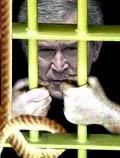| Find |
Friday, 1 February 2008
Deadly Hubris
A million Iraqis dead – for what?
The UK's Opinion Research Business has released another statistical study of Iraqi casualties since the launching of the American invasion, one that updates, revises, and essentially confirms their earlier estimate of a million-plus dead. The price of "liberation" is indeed high, but was it worth it? The Iraqis have a simple answer: some 60 percent tell pollsters attacks on US and allied military personnel are justified. So much for being greeted with garlands of flowers and hailed as "liberators."
The Americans have a similar, if less emphatic answer: a recent poll asking if the invasion and subsequent occupation "was or was not worth the number of U.S. military casualties and the financial cost of the war" yields a resounding no, with 59 percent – up three points.
A million dead – and for what?
So that the neoconservatives could stand astride Washington and the world, bellowing threats and beating their chests in the wake of 9/11, braying that everything – everything – had changed, especially the basic rules of human decency. Because it was "doable," as Paul Wolfowitz put it. Because our foreign policy is in large part built around the concept of making the Middle East safe for Israel. And, most of all, because of the sheer hubris of those who thought themselves above the laws of God and man – who thought they were gods, and let loose American thunderbolts with reckless abandon, with deadly consequences.
The response to the last ORB data release was vehement: the US government, which doesn't even bother counting Iraqi dead and wounded, derided it, and the neoconservative pundits lit into it as "propaganda" and an exaggeration, whilst the more ambitious assailed the methodology of every attempt to measure the vast war crime that the killing fields of Iraq represent.
Yet the results of the ORB study have been expanded, to include estimates from rural as well as urban areas. The major criticism of the previous study was that the emphasis on conducting interviews in urban areas skewed the results in the direction of an overestimation: the revised study meets this critique head on, covering all areas of the country except for Karbala and Al Anbar, for safety reasons, and also Irbil – for political reasons. It seems Kurdish regional government officials weren't eager for a full accounting of the war dead, for reasons best known to themselves: the interviewers were barred from conducting interviews in the area. The impact of these omissions pushes their estimate downward, and yet the number is astonishing. More
Posted at
15:12
![]()
Post Title: Deadly Hubris
![[Zionazis-1.jpg]](https://blogger.googleusercontent.com/img/b/R29vZ2xl/AVvXsEg_x8DOGucgHQmfJJujuK_oYJdxhEnskhQqt-Og7lSk52HeaDQYzW8NQWfdpHmPgj_FJN0jJ3tz1prR1jVZHdHky2HDQxxcs4LVxX0DtAt3fG0sfRr6MDx7Sz8cJNjl0k0RS9TbCjangQ/s1600/Zionazis-1.jpg)




